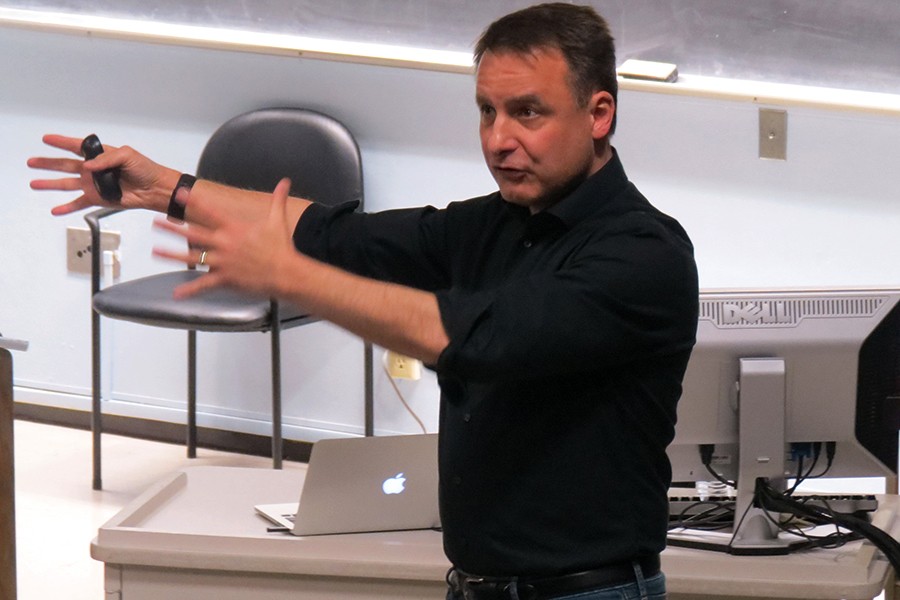Environmental scientist exposes carbon impact
Dr. Jonathan Foley gives a presentation on climate change to science majors and other interested students in LA-100 on March 18.
Apr 11, 2016
“We are exhausting our planet,” Jonathan Foley, executive director of the California Academy of Sciences, said. His voice filled LA-100 as he stood before a group of curious Contra Costa College students on March 18.
He laid out his lecture and proposition that inhabitants of the Earth are spontaneously tiptoeing toward the limits of what the planet can naturally and comfortably do to sustain its existence.
The lecture focused on the sustainability of the planet, the ecosystems and the natural resources people depend on.
According to Dr. Foley, the Earth’s population has more than doubled in the last 50 years and the economy grew about seven-folds. This combination has amplified the global food and water consumption and swelled fossil fuel combustion.
It is these growing challenges, which pose a challenge to satisfying the increasing food demands in a way that doesn’t waste resources, he said.
While laying out the geographical and geological aspects of the issue, Foley went deeper into addressing the issues of how exactly individuals are running out of resources. Foley singled out agriculture as the biggest thing being done in terms of people using up and harming the land.
Agriculture stands as the biggest threat to the environment, as it causes a loss in the service of the ecosystem as well as playing a role in global warming.
He points out that in the U.S. alone, 39 percent of freshwater, as the U.S. Geological Survey estimates, is used to irrigate crops. Yet, as highlighted in the lecture, land is not the only natural resource that is immensely consumed for agriculture. Water withdrawals are also consumed to irrigate crops and 90 percent of the water used is not returned.
The lecture traveled into diverse topics while addressing the issue of exhausting the planet.
“I think we are too indulged in our own worlds to really think about what we are exactly doing to this planet,” engineering major Almas Amjad said. “What Dr. Foley is talking about is the real issue, not from one side but from many.”
“Is feeding nine billion people possible?” Foley asked the audience.
He suggested that the most important system to counter the exhausting of the planet is the approach in maintaining sustainability.
Consumption patterns are important drivers of the developmental patterns in most industrialized countries.
As Foley indicated, when increasing the productivity of agriculture, first people need to understand that feeding animals plant materials yields low returns. As a result the Earth is actually losing more energy than it is gaining from this consumption pattern.
Almost 80 percent of farmlands in Minnesota are used to grow crops that are used for animal consumption rather than human. Using these farmlands for human use is one of the ways to maintain a more sustainable lifestyle.
Foley said when people look at the economics behind it again, there exists a basic demand and supply curve. Where a greater demand for meat products exists, there is less availability of plant-based foods.
Amjad said, “Is it possible to feed nine billion people? The answer (is) no, but optimistically yes it is. But it is not easy (to be optimistic).”
Psychology major Nick Hui said he appreciated the rationality of Foley when addressing the issue. “He provided a level-headed solution to the issue and doesn’t hold on to vague resolutions.”


